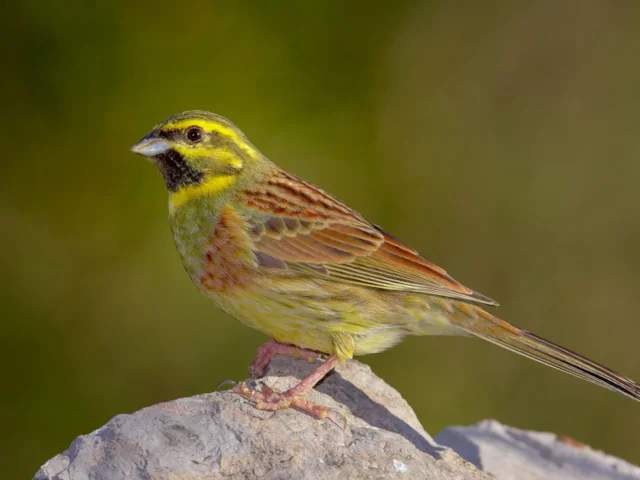Public asked to earmark environment money
97daf94d-c798-47e4-85dd-2b986f5595b3

The public are being asked exactly how they want billions of pounds of public money to be spent in the countryside for the rest of the decade.
In the next few weeks, Environment Secretary Owen Paterson will have to decide how to spend the £2 billion of public money available each year from England’s agricultural budget, and for the first time members of the public are being consulted in a consultation launched by DEFRA. Farming dominates three-quarters of England’s countryside, and the RSPB believe that it’s right that everyone has their say.
In a statement to the House of Commons earlier this year, Owen Paterson indicated that he was ‘minded’ to transfer the maximum amount (15 per cent) of funding available under the newly reformed Common Agricultural Policy (CAP) to schemes that benefit rural communities and the environment. We welcome the clear preference in the consultation to follow through on this intention.
Agri-environment schemes have helped farmers restore farmland wildlife for almost two decades. In particular these schemes have rewarded farmers who protect rare birds such as Stone-curlew and Cirl Bunting, which leapt in England from 118 pairs in 1989 to around 1,000 pairs today.
These funds have provided a valuable lifeline in helping threatened species recover, but the State of Nature report – published in May by a coalition of 25 British wildlife groups – revealed worrying declines of many species of farmland wildlife, including wild flowers and butterflies. Conservationists believe that against the backdrop of declines in farmland wildlife, these funds are needed now more than ever.
Martin Harper, RSPB Conservation Director, said: “Three-quarters of England is farmed and that means farmers have a huge responsibility to look after a great proportion of our wildlife. We think money spent on farming needs to work much harder for our wildlife in order to halt the declines highlighted by the State of Nature report and begin to rebuild a countryside rich in nature.
“Wisely spent, farming budgets can do more than anything else to help restore beleaguered wildlife. Over the last two decades, an increasing number of farmers have embraced the challenge and taken action through environmental funding schemes. But we need more farmers doing more of what we know will work, and this means protecting and growing the funding. Otherwise, without funding farmland wildlife will inevitably decline further.
“Over the next four weeks, the public has an opportunity to agree with Owen Paterson that there is a strong case for protecting wildlife and the countryside, and that funding should be directed to those farmers who help protect wildlife and conserve threatened landscapes.”
The RSPB is asking public and supporters to express their views on the future of the countryside. Please visit: www.rspb.org.uk/votefornature.
In the next few weeks, Environment Secretary Owen Paterson will have to decide how to spend the £2 billion of public money available each year from England’s agricultural budget, and for the first time members of the public are being consulted in a consultation launched by DEFRA. Farming dominates three-quarters of England’s countryside, and the RSPB believe that it’s right that everyone has their say.
In a statement to the House of Commons earlier this year, Owen Paterson indicated that he was ‘minded’ to transfer the maximum amount (15 per cent) of funding available under the newly reformed Common Agricultural Policy (CAP) to schemes that benefit rural communities and the environment. We welcome the clear preference in the consultation to follow through on this intention.
Agri-environment schemes have helped farmers restore farmland wildlife for almost two decades. In particular these schemes have rewarded farmers who protect rare birds such as Stone-curlew and Cirl Bunting, which leapt in England from 118 pairs in 1989 to around 1,000 pairs today.
These funds have provided a valuable lifeline in helping threatened species recover, but the State of Nature report – published in May by a coalition of 25 British wildlife groups – revealed worrying declines of many species of farmland wildlife, including wild flowers and butterflies. Conservationists believe that against the backdrop of declines in farmland wildlife, these funds are needed now more than ever.
Martin Harper, RSPB Conservation Director, said: “Three-quarters of England is farmed and that means farmers have a huge responsibility to look after a great proportion of our wildlife. We think money spent on farming needs to work much harder for our wildlife in order to halt the declines highlighted by the State of Nature report and begin to rebuild a countryside rich in nature.
“Wisely spent, farming budgets can do more than anything else to help restore beleaguered wildlife. Over the last two decades, an increasing number of farmers have embraced the challenge and taken action through environmental funding schemes. But we need more farmers doing more of what we know will work, and this means protecting and growing the funding. Otherwise, without funding farmland wildlife will inevitably decline further.
“Over the next four weeks, the public has an opportunity to agree with Owen Paterson that there is a strong case for protecting wildlife and the countryside, and that funding should be directed to those farmers who help protect wildlife and conserve threatened landscapes.”
The RSPB is asking public and supporters to express their views on the future of the countryside. Please visit: www.rspb.org.uk/votefornature.

